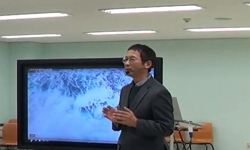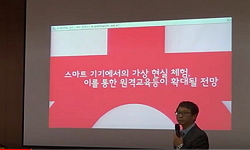본 연구는 장횡거(張橫渠) 기론(氣論)과 왕양명(王陽明) 양지설(良知說)의 구조적 유사성을 기초로 장횡거 기론에 대한 양명학적 변용을 해명하는데 있다. 여기서 필자는 송명유학의 본질이 ...
http://chineseinput.net/에서 pinyin(병음)방식으로 중국어를 변환할 수 있습니다.
변환된 중국어를 복사하여 사용하시면 됩니다.
- 中文 을 입력하시려면 zhongwen을 입력하시고 space를누르시면됩니다.
- 北京 을 입력하시려면 beijing을 입력하시고 space를 누르시면 됩니다.

왕양명 양지설의 장횡거 기론적 해석 = The Interpretation about Yang-ming’s Liang-zhi Theory on the Basis of Heng-qu’s Qi-Theory - The Development and Transformation of Yang-ming studies in the Zhang Heng-qu’s Qi-theory
한글로보기https://www.riss.kr/link?id=A100862534
- 저자
- 발행기관
- 학술지명
- 권호사항
-
발행연도
2015
-
작성언어
Korean
-
주제어
장횡거 ; 왕양명 ; 기 ; 양지 ; 태허 ; 본체 ; 작용 ; 도덕형이상학 ; Zhang Heng-qu ; Wang Yang-Ming ; Qi(氣) ; Liang-zhi(良知) ; Tai-xu (太虛) ; Original Substance(本體) ; function(作用) ; Moral Metaphysics
-
등재정보
KCI등재
-
자료형태
학술저널
- 발행기관 URL
-
수록면
85-116(32쪽)
-
KCI 피인용횟수
1
- DOI식별코드
- 제공처
-
0
상세조회 -
0
다운로드
부가정보
국문 초록 (Abstract)
본 연구는 장횡거(張橫渠) 기론(氣論)과 왕양명(王陽明) 양지설(良知說)의 구조적 유사성을 기초로 장횡거 기론에 대한 양명학적 변용을 해명하는데 있다. 여기서 필자는 송명유학의 본질이 도덕형이상학의 구축에 있으며, 이런 관점에서 왕양명의 양지설은 장횡거 기론을 토대로 발전된 이론이라고 파악했다. 사실 장횡거의 기론은 객관적 현상세계를 구성하는 ‘기(氣)’를 바탕으로 인간의 본성을 설명하고 그 도덕적 의미를 제시하려는 시도이고, 왕양명의 양지설은 도덕실천주체로서 인간의 도덕본심에 초점을 두고 ‘양지(良知)’의 이론을 전개하면서 동시에 ‘양지’로써 만물일체를 이루는 도덕이론을 구축하려는 시도라는 점에서, 장횡거와 왕양명의 학문체계는 그 방법론적 차이가 명확하게 드러난다. 하지만, 송명유학의 본질과 도덕형이상학의 구축이라는 시각에서 보면, 장횡거는 ‘기’를 본체와 작용으로 구분하여 천도가 유행하는 우주생성변화의 자연법칙이 인간 본성의 도덕법칙과 동일함을 강조하면서, ‘천도(天道)’와 ‘성명(性命)’이 하나로 관통하여 만물일체가 되는 도덕형이상학을 구축했고, 왕양명은 ‘양지’를 인간의 도덕본체로 삼고 그 도덕본체의 작용을 통해 나와 만물이 ‘양지’로써 일체가 되는 도덕형이상학을 구축했다는 점에서 장횡거와 왕양명이 바라보는 송명유학의 본질은 서로 일치한다고 할 수 있다. 아울러 필자는 왕양명이 양지설을 확립할 때, 장횡거의 ‘태허(太虛)’와 ‘기’, 그리고 체용(體用)관계의 이론구조를 수용하여 전개했다는 점에서 왕양명의 양지설을 장횡거 기론의 양명학적 변용으로 이해하였다. 따라서 왕양명이 자신의 독창적인 양지설을 확립하는 데 장횡거의 기론은 왕양명에게 적지 않은 사상적 영향을 주었다고 할 수 있다.
다국어 초록 (Multilingual Abstract)
Actually, the Qi-theory of Zhang Heng-qu explains human nature based on ‘Qi (氣)’ which composes objective the Phenomenal World and tries to suggest it’s ethical meaning. Meanwhile, the Liang-zhi theory of Wang Yang-Ming develop Liang-zhi theory with focusing the moral real intention as subject of moral practice and tries to build moral theory which form the Unity as Liang-zhi(良知). In this regard, the study system of Zhang Heng-qu and Wang Yang-Ming shows some methodological differences.
But in essence of Song-Ming Confucianism and building of Moral Metaphysics view, Zhang Heng-qu built a moral metaphysics which became the unity by going through ‘Tian-dao(天道)’ and ‘Xing-ming(性命)’ with a emphasis on the same of the universe creation’s law of nature and human nature’s moral principles. Wang Yang-Ming made an human’s moral original substance of a Liang-zhi and built of Moral Metaphysics which made oneself and all creation into a Liang-zhi through the effect of moral original substance. In this respect, the essence of Song-Ming Confucianism of Zhang Heng-qu and Wang Yang-Ming could say that it have concurred with each other.
Also, this study understood that the Liang-zhi theory of Wang Yang-Ming is a Psychological variant the Qi-theory of Zhang Heng-qu in that accepting the Zhang Heng-qu’s ‘Tai-xu(太虛)’, ‘Qi(氣)’ and ‘Ti-yong(體用)’ when Wang Yang-Ming established the Liang-zhi theory. So, this study concluded that the Qi-theory of Zhang Heng-qu have a strong influence on Wang Yang-Ming in establishing his creative Liang-zhi theory.
This study’s purpose is to explain the transformation of Yang-ming studies based on structural Similarity of the Qi-theory(氣論) of Zhang Heng-qu(張橫渠) and the Liang-zhi theory(良知說) of Wang Yang-Ming(王陽明). This study understood th...
This study’s purpose is to explain the transformation of Yang-ming studies based on structural Similarity of the Qi-theory(氣論) of Zhang Heng-qu(張橫渠) and the Liang-zhi theory(良知說) of Wang Yang-Ming(王陽明). This study understood that the essence of Song-Ming Confucianism is to build a Moral Metaphysics. In this respect, this study judged that the Liang-zhi theory of Wang Yang-Ming had improved with the help of the Qi-theory of Zhang Heng-qu.
Actually, the Qi-theory of Zhang Heng-qu explains human nature based on ‘Qi (氣)’ which composes objective the Phenomenal World and tries to suggest it’s ethical meaning. Meanwhile, the Liang-zhi theory of Wang Yang-Ming develop Liang-zhi theory with focusing the moral real intention as subject of moral practice and tries to build moral theory which form the Unity as Liang-zhi(良知). In this regard, the study system of Zhang Heng-qu and Wang Yang-Ming shows some methodological differences.
But in essence of Song-Ming Confucianism and building of Moral Metaphysics view, Zhang Heng-qu built a moral metaphysics which became the unity by going through ‘Tian-dao(天道)’ and ‘Xing-ming(性命)’ with a emphasis on the same of the universe creation’s law of nature and human nature’s moral principles. Wang Yang-Ming made an human’s moral original substance of a Liang-zhi and built of Moral Metaphysics which made oneself and all creation into a Liang-zhi through the effect of moral original substance. In this respect, the essence of Song-Ming Confucianism of Zhang Heng-qu and Wang Yang-Ming could say that it have concurred with each other.
Also, this study understood that the Liang-zhi theory of Wang Yang-Ming is a Psychological variant the Qi-theory of Zhang Heng-qu in that accepting the Zhang Heng-qu’s ‘Tai-xu(太虛)’, ‘Qi(氣)’ and ‘Ti-yong(體用)’ when Wang Yang-Ming established the Liang-zhi theory. So, this study concluded that the Qi-theory of Zhang Heng-qu have a strong influence on Wang Yang-Ming in establishing his creative Liang-zhi theory.
목차 (Table of Contents)
- 요약문
- I. 들어가는 말
- II. 장횡거의 기론과 도덕형이상학적 의의
- III. 장횡거 기론의 양명학적 발전과 변용
- IV. 나가는 말
- 요약문
- I. 들어가는 말
- II. 장횡거의 기론과 도덕형이상학적 의의
- III. 장횡거 기론의 양명학적 발전과 변용
- IV. 나가는 말
- 참고문헌
- ABSTRACT
참고문헌 (Reference)
1 장재, "정몽" 책세상 2002
2 왕양명, "전습록 (전2권)" 청계출판사 2001
3 황갑연, "왕양명 철학" 서광사 1996
4 진래, "송명성리학" 예문서원 1997
5 최재목, "공허의 실학: 태허사상의 양명학적 굴절" 11 : 1995
6 蒙培元, "理學範疇系統" 人民出版社 9-, 1989
7 "王陽明全集" 上海古籍出版社 2006
8 장윤수, "氣學과 心學의 횡단적 소통구조에 관한 연구 - 張橫渠와 王陽明의 이론을 중심으로 -" 대한철학회 130 : 247-276, 2014
9 "朱子語類" 中華書局 1986
10 勞思光, "新編中國哲學史 (三上)" 三民書局 2007
1 장재, "정몽" 책세상 2002
2 왕양명, "전습록 (전2권)" 청계출판사 2001
3 황갑연, "왕양명 철학" 서광사 1996
4 진래, "송명성리학" 예문서원 1997
5 최재목, "공허의 실학: 태허사상의 양명학적 굴절" 11 : 1995
6 蒙培元, "理學範疇系統" 人民出版社 9-, 1989
7 "王陽明全集" 上海古籍出版社 2006
8 장윤수, "氣學과 心學의 횡단적 소통구조에 관한 연구 - 張橫渠와 王陽明의 이론을 중심으로 -" 대한철학회 130 : 247-276, 2014
9 "朱子語類" 中華書局 1986
10 勞思光, "新編中國哲學史 (三上)" 三民書局 2007
11 牟宗三, "心體與性體 (第一冊)" 正中書局 2006
12 허남진, "張載의 氣一元論과 任聖周의 氣一分殊說" 규장각한국학연구원 (43) : 161-172, 2008
13 "張載集" 中華書局 2008
14 양승무, "張橫渠 “正蒙”의 天道論 연구" 한국유교학회 (21) : 141-190, 2004
15 陳來, "宋明理學" 洪葉文化事業有限公司 1994
16 牟宗三, "宋明儒學的問題與發展" 聯經 2003
17 "孟子"
18 "傳習錄"
19 "中庸"
동일학술지(권/호) 다른 논문
-
- 한국양명학회
- 이상훈(Lee, Sang-Hun)
- 2015
- KCI등재
-
- 한국양명학회
- 이우진(Lee, Woo-Jin)
- 2015
- KCI등재
-
- 한국양명학회
- 천병돈(Chun, Byung-Don)
- 2015
- KCI등재
-
- 한국양명학회
- 김덕균(Kim, Duk-Kyun)
- 2015
- KCI등재
분석정보
인용정보 인용지수 설명보기
학술지 이력
| 연월일 | 이력구분 | 이력상세 | 등재구분 |
|---|---|---|---|
| 2027 | 평가예정 | 재인증평가 신청대상 (재인증) | |
| 2021-01-01 | 평가 | 등재학술지 유지 (재인증) |  |
| 2018-01-01 | 평가 | 등재학술지 유지 (등재유지) |  |
| 2015-01-01 | 평가 | 등재학술지 유지 (등재유지) |  |
| 2011-01-01 | 평가 | 등재학술지 유지 (등재유지) |  |
| 2009-01-01 | 평가 | 등재학술지 유지 (등재유지) |  |
| 2006-01-01 | 평가 | 등재학술지 선정 (등재후보2차) |  |
| 2005-05-30 | 학술지명변경 | 한글명 : 陽明學 -> 양명학 |  |
| 2005-01-01 | 평가 | 등재후보 1차 PASS (등재후보1차) |  |
| 2004-01-01 | 평가 | 등재후보학술지 유지 () |  |
| 2003-01-01 | 평가 | 등재후보학술지 선정 (신규평가) |  |
학술지 인용정보
| 기준연도 | WOS-KCI 통합IF(2년) | KCIF(2년) | KCIF(3년) |
|---|---|---|---|
| 2016 | 0.63 | 0.63 | 0.46 |
| KCIF(4년) | KCIF(5년) | 중심성지수(3년) | 즉시성지수 |
| 0.42 | 0.39 | 1.123 | 0.06 |




 KCI
KCI DBpia
DBpia






